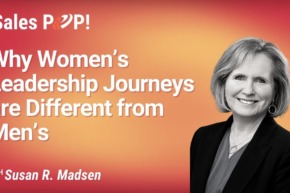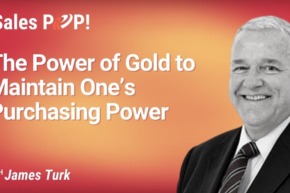There is often very little training for salespeople on handling rejections. If a salesperson isn’t able to handle how a “no” impacts them, it could impact their next call, their next activity, and can even compound into altering how they perceive their abilities. Being resilient, and knowing what to do in the face of that self-doubt is key in the sales industry. John Golden discusses this idea with Michael Licenblat.
In this expert sales interview, Licenblat shares his insights on:
- The importance of resilience for salespeople
- How negative thinking can lead to a self-fulfilling prophecy
- How to allow for failure without expecting it
The Self-Fulfilling Rut
The traditional approach is to go into a sale thinking, “you’re fantastic, you can do it,” etc. and turning up with the best version of oneself. However, there is a sharp drop between being elevated and excited, and falling flat when getting a no. After encountering failure, if you stay down and operate from a negative mindset, you can get stuck in this self-fulfilling rut.
Allow for failure, don’t expect it
There is a difference between knowing that rejection is part of the job and expecting it to happen. However, there is a way to anticipate failure while still maintaining confidence as a salesperson. By anticipating that some of the calls will end in no, you can allow for failure, instead of expecting it. It doesn’t mean that you’re a bad salesperson, it just means that there are a lot of reasons why a consumer might not buy at the current time. Allowing for failure empowers the salesperson to continue with confidence after getting a “no.”
Future Vision
Look at what’s ahead of you instead of what’s behind you. The feeling of possibility is what drives resilience, not the shame that is carried from past failures. When setting a target, Licenblat recommends that 80% of the focus be on forwarding movement, and 20% be on how to improve from past mistakes.
When a Client Says “No”
Licenblat recommends assessing yourself and the situation in order to understand what went wrong, and the true meaning behind getting a “no.” Being able to identify the problem and make adjustments will help you be more successful in your next endeavor, but also help you recover quickly. Some important questions to ask are, “Is it me?” “Is it my preparation?” Is it them, are they not ready to buy” “Is it in my presentation?” The tendency to blame oneself after a sale goes bad is very high amongst salespeople, and being able to say, “It may not be me, it may be these other factors,” can help remove self-doubt and shame and present a more clear picture of what is really going on. “Spend the least amount of time down possible,” says Licenblat. “The more you take things personally, the longer time you’re down. Recover from the rejection quickly so you can get back out there. “
About our Host:
John is the Amazon bestselling author of Winning the Battle for Sales: Lessons on Closing Every Deal from the World’s Greatest Military Victories and Social Upheaval: How to Win at Social Selling. A globally acknowledged Sales & Marketing thought leader, speaker, and strategist. He is CSMO at Pipeliner CRM. In his spare time, John is an avid Martial Artist.
Pipeliner CRM fully empowers salespeople to be resilient. Get your free trial of Pipeliner CRM now.







Comments